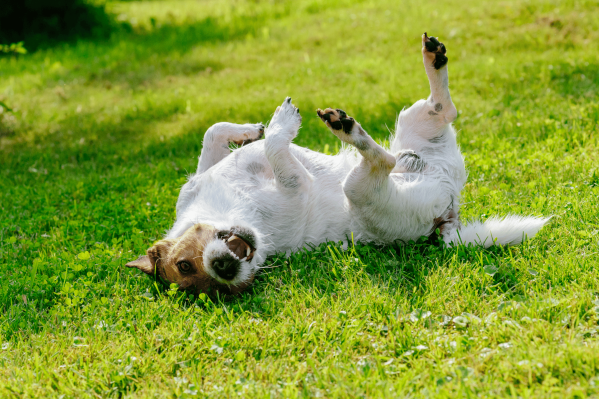Humans may be used to coping with dandruff, but when the telltale white flakes show up on their pups, it can feel very odd and mysterious.
Wondering what's causing your dog's dandruff and if there's any reason to worry?
Fortunately, it’s actually pretty common for dogs to have what looks like dandruff on their coat—and there are many different reasons your dog could be experiencing dry skin. Below we'll discuss dog dandruff, signs your dog has dry skin, potential causes, and how to help treat it.
Signs of dog dandruff
If your dog experiences some or most of the following dandruff symptoms, they may be experiencing dry skin:
Skin flakes
Excessive scratching
Red/scaly skin patches
Excessive licking and chewing
Causes of dog dandruff
Dandruff is the result of dry skin flaking and being trapped on the surface of the skin and fur. If your dog is showing signs of dandruff, they may have an underlying condition that is causing the dry skin.
If you’re not sure if your dog has dandruff, you can talk to a Pawp Pro or reach out to your primary veterinarian to determine what may be going on with their skin.
Common causes of dog dandruff include:
Under-grooming
Parasites
Allergies
Hypothyroidism
Under-grooming
When your dog licks and cleans themselves, it helps remove small amounts of skin flakes from their fur. When excess skin flakes are noticed, your dog may not be grooming themselves well, which can be indicative of an underlying health issue.
Parasites
Parasites in dogs such as fleas, ticks, and mange are a common reason for dry and scaly skin. Intestinal parasites such as hookworms, roundworms, and whipworms also cause skin issues from the nutritional depletion that the worms take from their host. Keeping your dog on a monthly heartworm prevention deworms them for heartworms and intestinal parasites.
Allergies
Allergic skin conditions can also cause dry, red, cracked, and flaky skin. An inhalant allergy, skin contact allergy, or a food allergy are the sources of most skin allergies in dogs. When your dog’s immune system overreacts to one of these sources, a histamine response is produced and causes redness, swelling, and itching.
Hypothyroidism
Hypothyroidism, Cushings, and other hormonal conditions can also cause skin changes due to the alteration of the body’s regulation of hormone production and metabolism. Hypothyroidism causes thinning of the coat, dry and brittle hair, dry skin, and hair loss along the back and tail. Similar to hypothyroidism, Cushings presents similarly with the addition of hair loss on the rear legs and total body hair loss.
Dog dandruff treatment
There are a few remedies you can try to treat your dog's dandruff, but it's always best to consult your veterinarian so they can ensure that there are no underlying conditions.
Bathing
It's important to bathe your dog regularly but to not over-bathe so you don't strip the skin and coat from the skin’s natural oils. Bathing every two weeks with an oatmeal and/or aloe shampoo and conditioner will cleanse the skin and fur without stripping the coat.
Medicated shampoos can also be used for dogs with skin allergies. Sometimes, the bathing frequency is increased when using medicated products. Talk to your veterinarian or a Pawp Professional for advice on which medicated shampoo would be best for your dog.
Nutrition
A balanced diet is a key factor for a healthy skin and coat. Dogs who are lacking in essential vitamins and minerals will often have dull coat and dry skin. A quality brand of dog food can provide your pup with all of the necessary nutrients. If your dog’s skin and coat is dry, ask a veterinarian if you're feeding your dog a proper diet for their age, breed, and health factors.
Supplements
Some dogs need supplements in conjunction with a quality diet. Supplements containing Omega 3 and 6 will greatly improve your dog’s skin by reducing itching, inflammation, and irritation.
For extra skin support, consider improving your dog's intake of fatty acids, as these help to create healthy skin and a shiny coat. Good sources of fatty acids include fish oil, flaxseed oil, and chia seeds. It's highly recommended to use a supplement formulated for dogs and give it according to the label for their weight range. Toxicity can occur with high doses of fish oil. Ask your veterinarian or a Pawp Professional for advice on a fatty acid supplement to give your dog.

Reviewed and fact-checked by
Mika, RVT at Pawp
